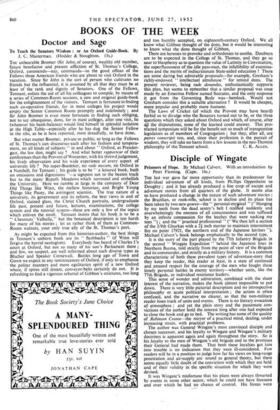BOOKS OF THE WEEK
Doctor and Sage
To Teach the Senators Wisdom : or An Oxford Guide-Book. By J. C. Masterman. (Hodder & Stoughton. 15s.) THE unbearable Boomer (Sir John, of course), wealthy old member, future benefactor and present affliction of St. Thomas's College, Oxford, commends—nay, commands—to the good offices of the Fellows three American friends who are about to visit Oxford in the vacation. Since Sir John is the sort of person who cultivates no friends but the influential, it is assumed by all that they must be at least of the rank and dignity of Senators. One of the Fellows, Tennant, enlists the aid of all his colleagues to compile, by means of a series of Common-Room sessions, a new and original guide-book for the enlightenment of the visitors. Tennant is fortunate in finding such co-operative friends, for in most colleges his project would empty the Senior Common Room promptly and indefinitely ; and Sir John Boomer is even more fortunate in finding such obliging, not to say obsequious, dons, for in most colleges, after one visit, he (whatever his bank-balance) would find himself in splendid isolation at the High Table—especially after he has dug the Senior Fellow in the ribs, as he is here reported, most dreadfully, to have done.
But what matter Boomer, private or public, so long as the Fellows of St. Thomas's can discourser each after his fashion and tempera- ment, on all kinds of subjects " in and about " Oxford, as Prender- gast, the law don, might say ? And what better rapporteur of their conferences than the Provost of Worcester, with his shrewd judgement, his lively observation and his wide experience of every aspect of university life ? No super-Baedeker, no vade mecum, no Oxford in a Nutshell, for Tennant ; his guide is to be " a leisured book, built on omissions and digressions "—a signpost not to the beaten track but to the many Bypath Meadows which surround and embellish the University. Here we ramble at large in the company of Dear Old Things like Winn, the mellow historian, and Bright Young Things like Pacey, the astringent scientist. The true nature of a university, its government and its reform, the best views in and of Oxford, stained glass, the Christ Church portraits, undergraduate life past, present and future, lectures, examinations, the college system and the tutorial system—these are only a few of the topics which enliven the stroll. Tennant insists that his book, is to be a " Chestnuts' Valhalla," but the botanical description is too harsh for many of his stories ; let us rather think of them as Common- Room walnuts, your only true ally of the St. Thomas's port.
As might be expected from this historian-author, the best things - in Tennant's unborn book are its " flashbacks " (if Winn will forgive the horrid neologism). Everybody has heard of Charles I's court at Oxford, but not so many of his son's Parliament there ; and few, we suspect, are well informed about such diverse types as Blucher and Speaker Cornewall. Battles long ago of Town and Gown we expect in any reminiscences of Oxford, if onlylo emphasise the politer manners and more egalitarian spirit of a new Oxford where, if spires still dream, conveyor-belts certainly do not. It is refreshing to find a vigorous rebuttal of Gibbon's strictures, too long and too humbly accepted, on eighteenth-century Oxford. We all know what Gibbon thought of the dons, but it would be interesting to know what the dons thought of Gibbon.
There are heresies to provoke and orthodoxies to soothe. Doubters are to be expected in the 'College of St. Thomas, and they go so near to blasphemy as to question the value of Latinity in Convocation, the superfluousness of the idle pass-man, the infallibility of examina- tions and the merits of indiscriminate State-aided education ! There are some daring but admirable proposals—for example, Gresham's richly-endowed " intellectual almshouse " for retired dons. The present reviewer, being rude donandus, enthusiastically supports this plan, but seems to remember that a similar proposal was once made by an Emeritus Fellow named Socrates, and the only response it got from the Governing Body was—hemlock. Would not Gresham consider this a suitable alternative ? It would be cheaper, more popular and probably more humane.
The Laws of Cricket (of which the Provost may have heard) forbid us to divulge who the Senators turned out to be, or the three questions which they asked about Oxford and which, of course, after all the disputations, none of the learned could answer. This pro- tracted symposium will be for the benefit not so much of transpontine legislators as of members of Congregation ; but they, after all, are patres conscripti too, and, since their profession is the pursuit of wisdom, they will take no harm from a few lessons in the neo-Thomist philosophy of the. Tennant school. C. K. ALLEN.


































 Previous page
Previous page